Songgai Ancient Town Chongqing - Precio de la entrada, horarios de apertura, transporte y aspectos más destacados

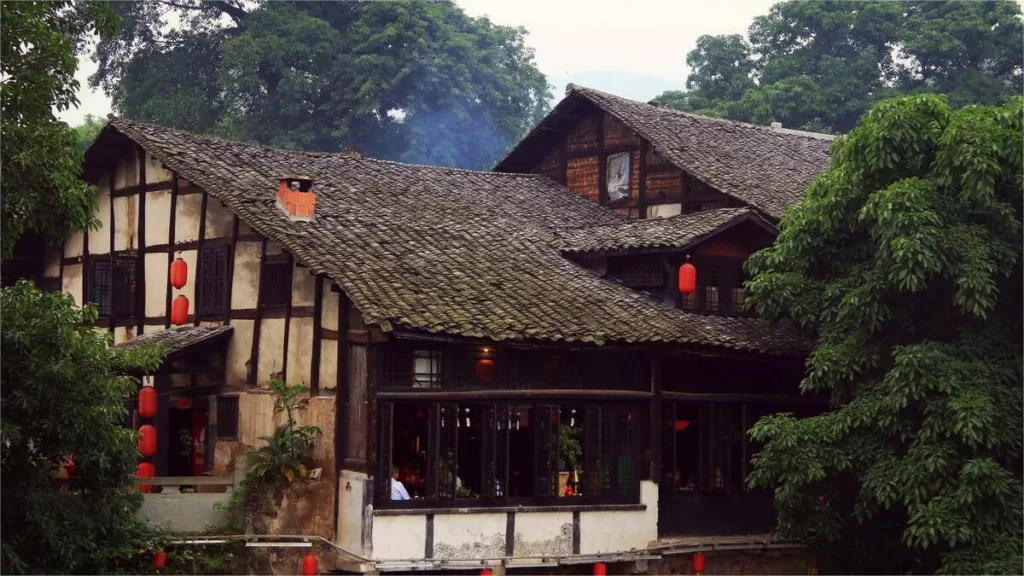
Songgai Ancient Town in Chongqing (重庆松溉古镇, Songji Ancient Town), whose exact founding date is now lost to history, has played a significant role as a trading hub for merchants from the regions of Yongchuan, Rongchang, Longchang, Luzhou, Tongliang, Dazu, and Neijiang, who conducted business and transported goods to Chongqing. The town is characterized by the “Three Clears and Seven Wonders,” where the “Three Clears” refer to its serene environment, clean stone pathways, and refreshing river breeze.
The town is renowned for its Ming and Qing architectural styles, featuring iconic structures like stilted houses, courtyards, and traditional wooden houses with tiled roofs. The town also boasts ancestral halls and temples, with the most notable ones being the Luo Family Ancestral Hall, the Chen Family Ancestral Hall, and the Qingji Temple. Winding through the town for approximately 5 kilometers, the stone pathways are a hallmark of Songgai’s unique charm. The town is also home to historical sites like Teacher’s Tomb, which is the final resting place of Chen Pengfei. Additionally, the Old County Office Mansion, locally known as the “Lao Guan Miao,” reflects the town’s historical significance as a government center.
Índice
- Información básica
- Ubicación y transporte
- Highlights of Songgai Ancient Town
- Vlog about Songgai Ancient Town
- Consejos útiles resumidos a partir de reseñas
- Otras atracciones del distrito de Yongchuan
Información básica
| Duración estimada de la visita | Media jornada |
| Precio del billete | Gratis |
| Horario de apertura | 24 horas al día durante todo el año |
| Número de teléfono | 0086-023-49546000 |
Ubicación y transporte
Songgai Ancient Town is situated in the southern part of Yongchuan District in Chongqing, China. It is located in Songgai Town, approximately 40 kilometers away from the Yongchuan District center. The geographical coordinates of Songgai Ancient Town are approximately 105°33′ east longitude and 29°08′ north latitude.
Here’s a step-by-step guide on how to reach Songgai Ancient Town from Chongqing:
- From Chongqing to Yongchuan:
- You can take a long-distance bus from various bus stations in Chongqing to Yongchuan. These buses are readily available and operate frequently. The journey typically takes around 1.5 to 2 hours to reach Yongchuan.
- From Yongchuan to Songgai Ancient Town:
- Upon arriving in Yongchuan, you will need to switch to local public transportation to reach Songgai Ancient Town. Local buses or minibusses are available for this leg of the journey. The ride to Songgai Ancient Town from Yongchuan usually takes approximately 1.5 hours.
Highlights of Songgai Ancient Town
Wenzhongba Island
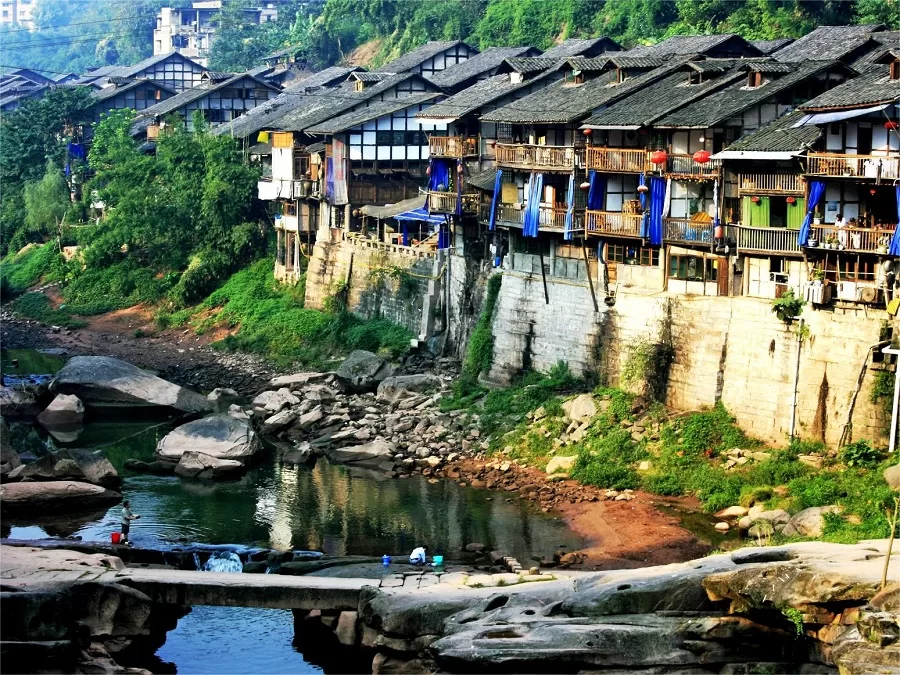
Wenzhongba is one of the largest islands in the upper reaches of the Yangtze River in Chongqing, where the river splits into two, creating a lush oasis surrounded by water on all sides. The island is known for its abundant reed growth and spacious sandbanks, and it is adorned with nearby attractions like Taizi Stone, Maozi Stone, Xiama Stone, and Wolong Stone Carvings, making it a delightful fusion of natural beauty and cultural heritage. In spring, the island is carpeted with lush greenery, and flocks of wild ducks can be seen, making it an ideal season for sand and stone collection. During summer, the rising river gives the island the appearance of a massive floating whale, and the vibrant vegetation comes to life. In autumn, the island showcases a bountiful harvest as local farmers gather their crops. Winter reveals the full character of Wenzhongba, with receding waters allowing visitors to explore the sandbanks.
Feilongdong Cliff Carvings
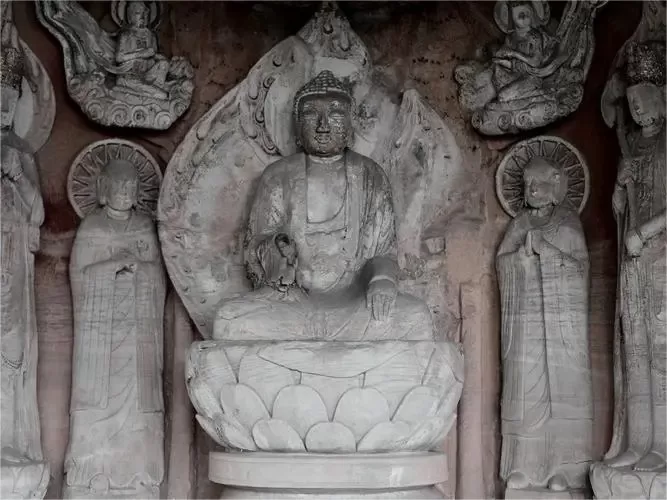
Situated on a precipice approximately 200 meters high, the Feilongdong Cliff Carvings feature a magnificent relief sculpture of Avalokitesvara created in the 15th year of the Ming dynasty’s Wanli era (1587). The sculpture, deeply carved and measuring 1.5 meters in height and 1 meter in width, is inset into the cliff, bringing the figure to life. The words “Feilongdong (飞龙洞),” carved by the Qing dynasty local official Chen Rujun, grace the top of the cliff in a clear and precise hand. The western face of the cliff bears the inscription “Chengongyan (陈公堰),” celebrating those who made significant contributions to water conservancy projects during the Ming dynasty. The cliff also features inscriptions of poems, verses, prefaces, and postscripts, offering a rich historical and artistic experience.
Ancient County Office
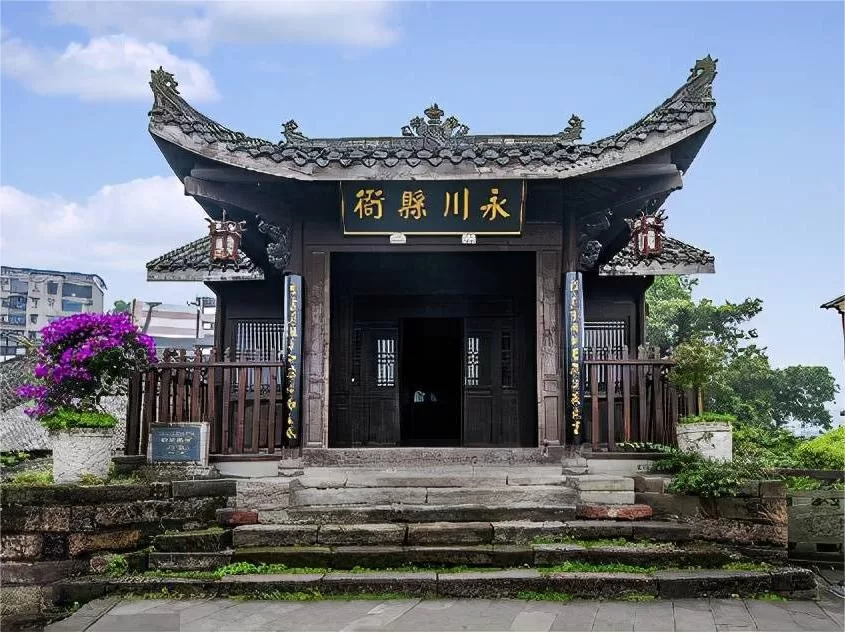
Locally known as the “Lao Guan Miao,” Songgai Ancient Town’s Office holds a significant historical role. During the Ming Dynasty in the 21st year of the Wanli era, the magistrate of Yongchuan, Xu Xiandeng, relocated the county office to Songgai. Visitors can catch a glimpse of this historical site by climbing over 20 stone steps from the main street at the Yushi Market. The foundation stones of the four halls of the old county office remain largely intact, with the front hall retaining a circular pedestal for a wooden pillar. Behind the rear hall, a spacious courtyard is enclosed by a surrounding wall, which hosts two ancient yellow locust trees. The back gate of the rear hall provides direct access to Zhu Yangxi Street, with the Yangtze River’s Wenzhongba Island visible on the opposite side.
Luo Family Ancestral Hall
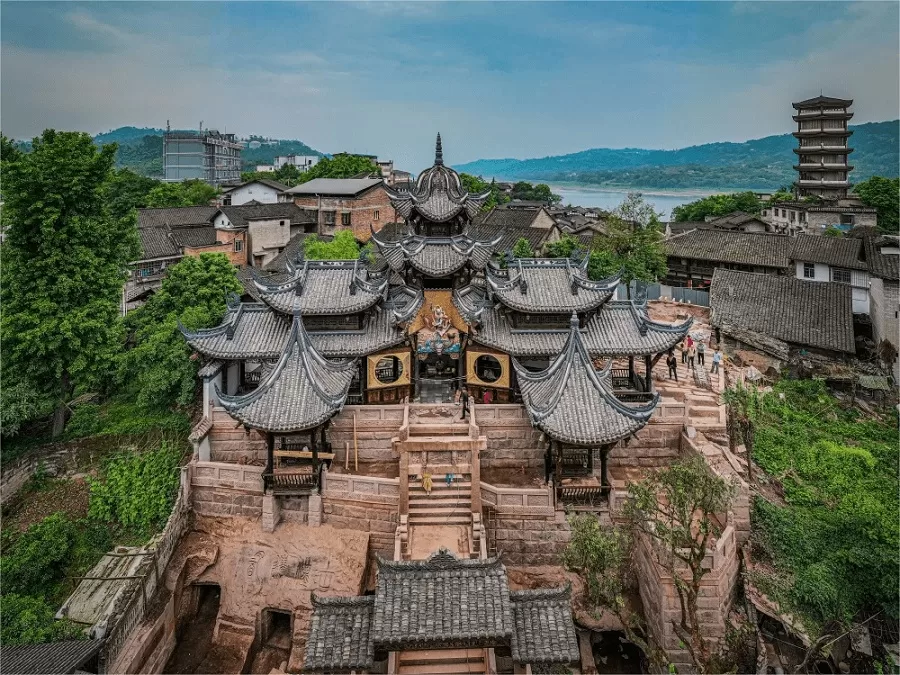
Situated on the slopes of Songzi Hill, the Luo Family Ancestral Hall was initially constructed during the Hongwu era of the Ming dynasty. Its founder, Luo Shengqiang, originally served as the Magistrate of Mayang in Jiangxi Province and later moved to Songgai, where he began building this ancestral hall. Under the supervision of Luo Qiying (the 14th generation descendant of the Luo family, who also served as the county magistrate in Qingshui, Gansu Province), the ancestral hall was finally completed. The building’s crossbeams, stone pedestals, and the west wall of the main hall are intricately adorned with beautiful patterns of flowers, birds, and figures. The main hall itself is constructed in the architectural style of “Wuyue Chaotian,” making it a symbol of Songgai Ancient Town.
Chen Family Grand Courtyard
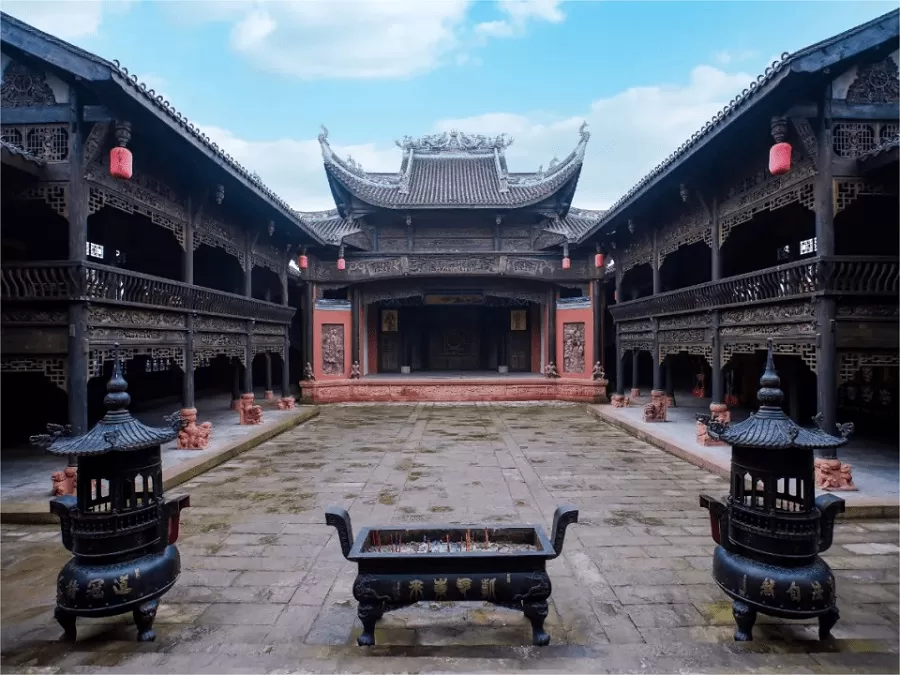
Located beside Liberation Street in the ancient town, the Chen Family Grand Courtyard dates back to the late Qing dynasty. The courtyard faces south and spans an area of approximately 0.27 hectares. It comprises several dozen buildings divided into four independent compounds, interconnected by passageways to form a harmonious whole. Most of the buildings are constructed with a wooden framework and blue-tiled roofs, featuring walls made of wooden boards, exemplifying the typical architectural style of the eastern Sichuan region. In the courtyard, a historic well with crystal-clear water, though no longer used for drinking, has remained untouched. The Chen family was once a prominent local family in Songgai, with a rich tradition of scholars for generations.
Vlog about Songgai Ancient Town
Consejos útiles resumidos a partir de reseñas
Early Arrival Advised: The road narrows as you enter Songgai Ancient Town, especially near the main gate. It’s recommended to arrive early in the day to avoid crowds, as the town tends to get busier during midday and afternoon hours.
Mejor época para visitarlo: Weekends are recommended for visiting Songgai Ancient Town. Many shops may not be open on regular weekdays, so weekends offer a better chance to explore the town and experience its atmosphere fully.
Managing Expectations: Songgai Ancient Town is described as somewhat run-down and small. Visitors should manage their expectations accordingly. However, its rustic charm makes it an ideal location for capturing nostalgic and vintage-style photographs.
Photo Opportunities at Riverside Teahouse: The riverside area near the Linjiang Teahouse is highly recommended for resting and taking photos. Adjacent to the Linjiang Teahouse, there is a milk tea shop offering various beverages. Visitors can enjoy a refreshing drink while taking in the views of the river and the town.
Otras atracciones del distrito de Yongchuan
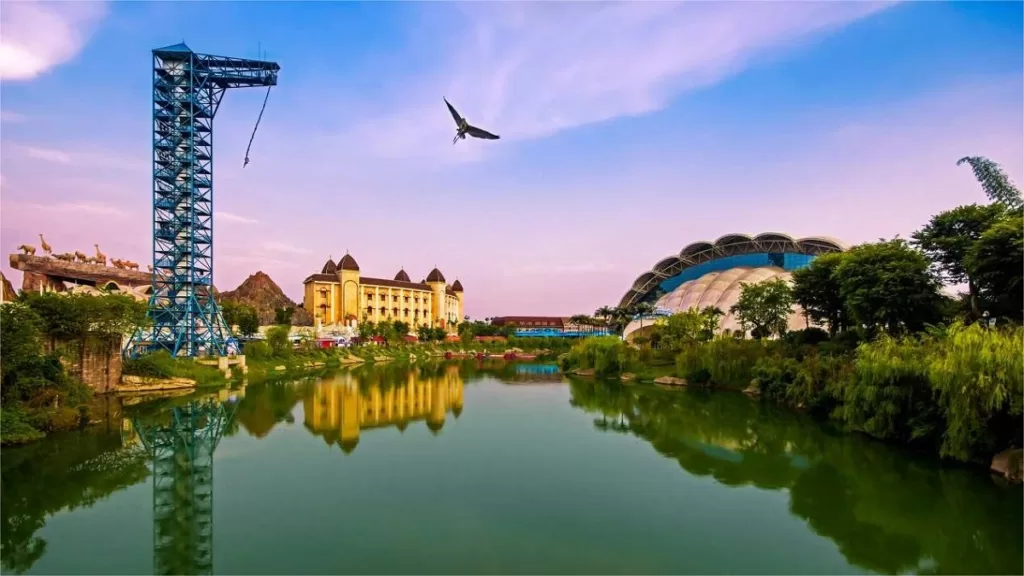
Lehe Ledu Wildlife Zoo
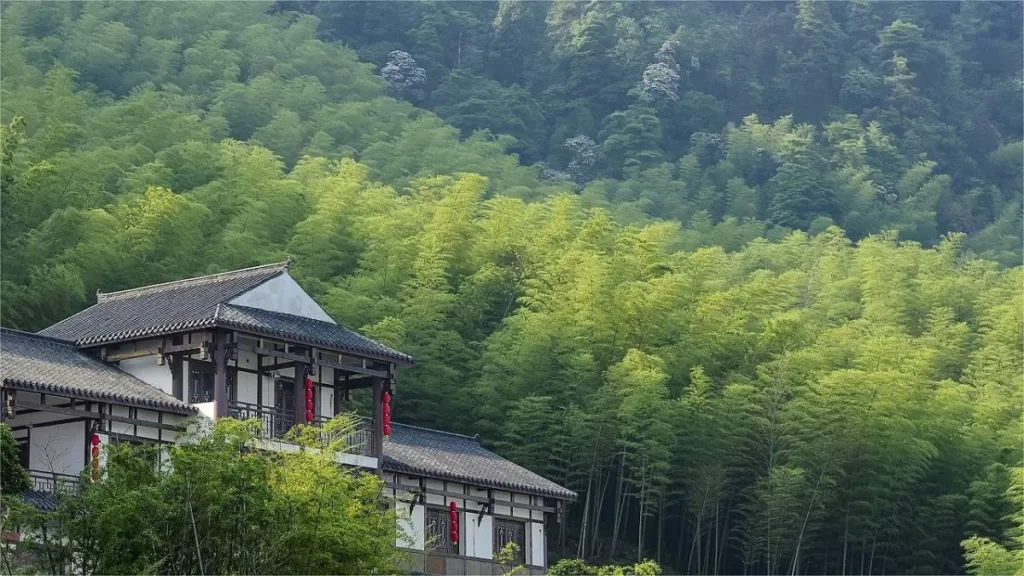
Tea Mountain Bamboo Sea
Lugares de interés en los suburbios de Chongqing, Lugares de interés en Yongchuan District Chongqing, Lugares históricos de Chongqing